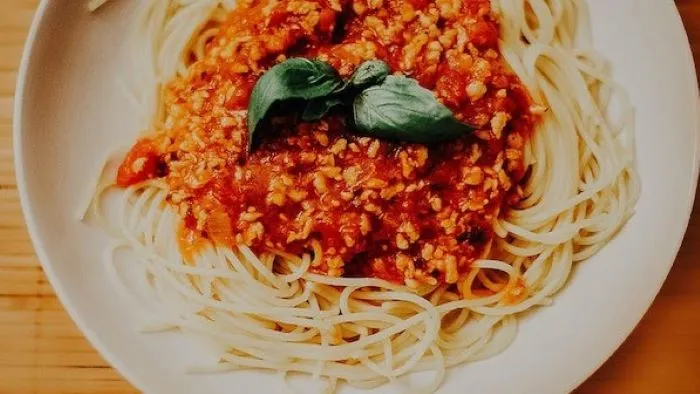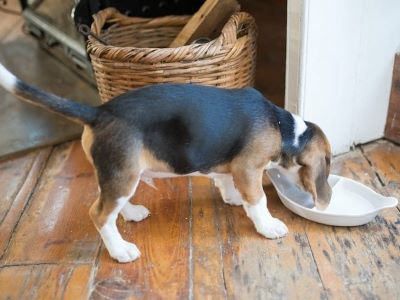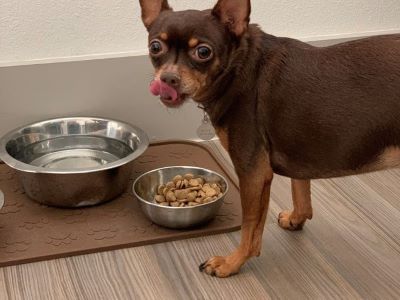Let’s talk about Quorn, Can Dogs Eat Quorn? Before you go out sharing your nuggets, let’s understand what this contains Quorn.
Quorn is a meat substitute product made from…wait for it…fungus, gasps! I know, who would’ve thought you could make mock chicken and roasts from fungus?!
In this article, we are going to understand the Quorn and everything that it contains. So, without further ado let’s begin….

Can Dogs Eat Quorn?
Yes, dogs can eat Quorn, but in moderate quantity. Originating in the UK, Quorn has become important in vegetarian and vegan diets. Veg burgers, sausages, and nuggets are just a few examples of Quorn-mixed recipes.
One of the crucial features of Quorn is its protein richness, making it a valuable alternative for those seeking non-meat protein sources. Proteins are important for muscle development and overall body function[1].
Quorn tends to be low in saturated fats, contributing to a heart-healthy diet. Unlike some traditional meat sources, it provides a lean option for those watching fat intake.
Quorn brings other important nutrients to the table, including fibre, vitamins, and minerals, making it a well-rounded addition to a balanced diet. Our dogs can consume both plant and animal-based foods.
While they have evolved as carnivores, their digestive systems allow for a diverse diet. Just like us, dogs thrive on a well-balanced diet that provides a mix of proteins, fats, carbohydrates, vitamins, and minerals.
A balanced diet supports their energy levels, immune system, and overall health. Quorn, with its unique origin and versatile uses, holds promise as a protein source. Yet, when it comes to our dogs, moderation and consideration of their individual needs are key.
Potential Benefits and Risks
Now, we understand the formation of quorns. Let’s the potential benefits:

- Just like how a good playlist sets the mood, protein is the backbone of a dog’s diet, contributing to muscle development, cell repair, and overall vitality.
- Quorn steps in as a plant-based protein source, offering an alternative for dogs with dietary restrictions or those seeking variety.
- Quorn, with its lean profile, provides a guilt-free option for pet parents mindful of their dog’s fat intake.
- A low-fat diet can be beneficial for maintaining a healthy weight and supporting heart health in our dogs.
Quorn has its perks as a protein-packed, low-fat option for our dogs. Yet, like any dietary addition, it comes with potential risks, let’s see them:
- Quorn, being a Keep an eye out for symptoms like itching, gastrointestinal upset, or changes in behaviour, and consult your vet if any concerns arise.
- Introducing new foods, including Quorn, may lead to digestive upsets like diarrhoea or vomiting in some dogs.
- Slowly introduce Quorn into your dog’s diet and monitor their response, adjusting portions as needed.
- Start with small portions, observe how your dog reacts, and adjust accordingly. A balanced diet includes a mix of protein sources, so Quorn can be a part of the chorus, not the solo act.
Preparing Quorn for Dogs
Well, enough with the boring talk and let’s move to the delicious part, Here we are going to learn about various cooking methods and how can we prepare them:
Cooking Methods




Seasonings to Avoid
Hold off on the salt shaker and spice cabinet! While a dash of flavour is tempting, excessive salt and certain spices can be harsh on your dog’s system. Opt for canine-friendly herbs like parsley or basil for a subtle aroma.
These may be kitchen staples, but for dogs, they’re a no-go. Onions and garlic can be toxic[2], potentially causing gastrointestinal distress or more severe issues.
Just like us, dogs are better off without artificial additives. Keep Quorn simple and free from things like artificial flavours and preservatives.
Serving Size
Introduce Quorn gradually into your dog’s diet, starting with small portions. This helps gauge their tolerance and prevents sudden digestive surprises. Monitor for any adverse reactions, and consult your vet if unsure.
Remember, Quorn is a complement, not the main course! Ensure a balanced diet by including various protein sources like meat, fish, and eggs to meet your dog’s nutritional needs.
Tailor the serving size to your dog’s size and activity level. A smaller dog may not need as much as a larger, more active counterpart. Adjust portions accordingly to maintain a healthy weight.
Keep it simple, watch out for dogs and your dog will be licking their bowl in appreciation!

Signs of Intolerance or Allergies
Keep a close eye on your dogs for signs of itching, scratching, or pawing. Persistent scratching may display an allergic response to Quorn. Let’s learn in the detail:
Dogs may express their discomfort through their stomachs. Watch out for diarrhoea, vomiting, or changes in bowel habits after introducing Quorn. Odd behaviour, lethargy, or changes in temperament may signal that something doesn’t agree with them.
Begin with tiny portions of Quorn and observe your dog’s reaction over several days. Note the quantity consumed, any unusual behaviours, and how their digestive system reacts. It’s like being a food detective for your pup!
Dogs have an incredible sense of smell. If they turn up their noses or seem disinterested, it might be a sign that Quorn isn’t their favourite, and that’s okay! If you notice any concerning signs or if your dog seems unwell, don’t hesitate to reach out to your vet.
When visiting the vet, provide detailed information about the introduction of Quorn, your dog’s reactions, and any changes in behaviour or health.
The more information, the better the diagnosis.
FAQs
Can Dogs Eat Quorn?
Quorn is generally safe and not harmful for humans and dogs to eat, but most Quorn-like sausage is made with a mixture of onion and garlic, both of which are toxic to dogs. Your dog should avoid eating Quorn food as it is a major cause of long-term health issues.
Can My Dog Eat Vegetarian Sausages?
Animals are often sensitive to foods commonly consumed by humans, and these sensitivities vary between species and breeds. As a result, we do not recommend that it be served to pets.
What Are the Negatives of Quorn?
Typical adverse reactions to Quorn products are vomiting, nausea, and diarrhoea. Hives, breathing difficulties, and potentially fatal anaphylactic reactions are less common. Many people have gone to emergency rooms for treatment of Quorn-related reactions.
Is Plant-Based Meat OK for Dogs?
Unfortunately, the answer is no – meat substitutes are not recommended for dogs. It probably won’t hurt your pup if they get a little, but it shouldn’t be a dietary staple. Beyond Meat is a plant-based meat product that uses processed ingredients and is high in fat and sodium which can upset your dog’s stomach.
Is Quorn Vegetarian?
Quorn is a tasty, meat-free protein source with a range of products suitable whether you are following a vegetarian or vegan diet, or if you are simply looking to reduce your meat consumption and eat in a simple, healthy and environmentally conscious way.
Conclusion
In conclusion “Can dogs eat Quorn?” While dogs bring joy to many, we must remain positive and consistent with our approach.
What is tolerable to one dog may leave others howling for relief. Signs of dog fatigue include irritability, increased shedding of belongings, and suspicious markings on the floor.
Stay cool and collected, life’s not so bad with a wet nose pressing your hand. Now go ahead and give your furry family member a good belly rub!
Reference:



